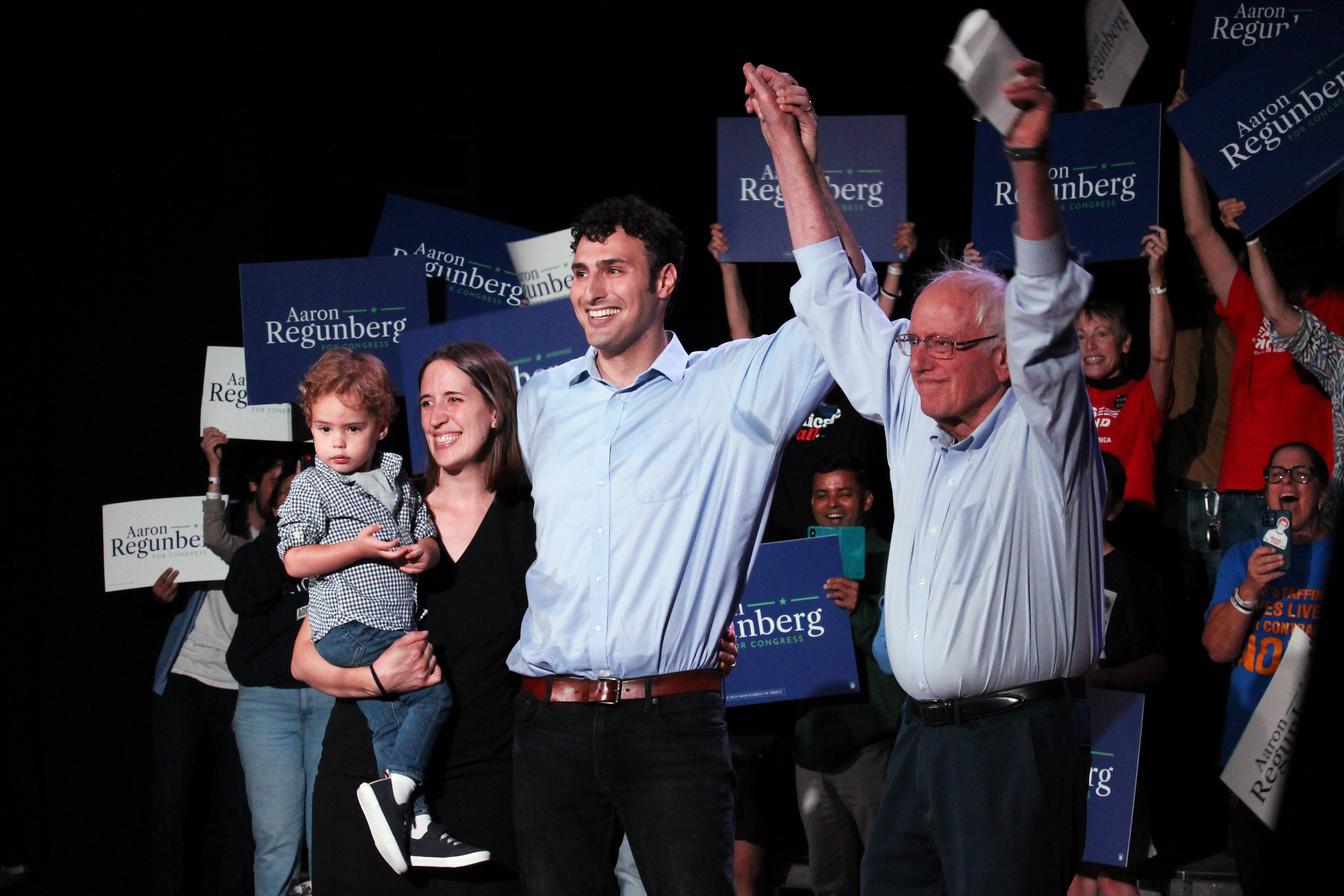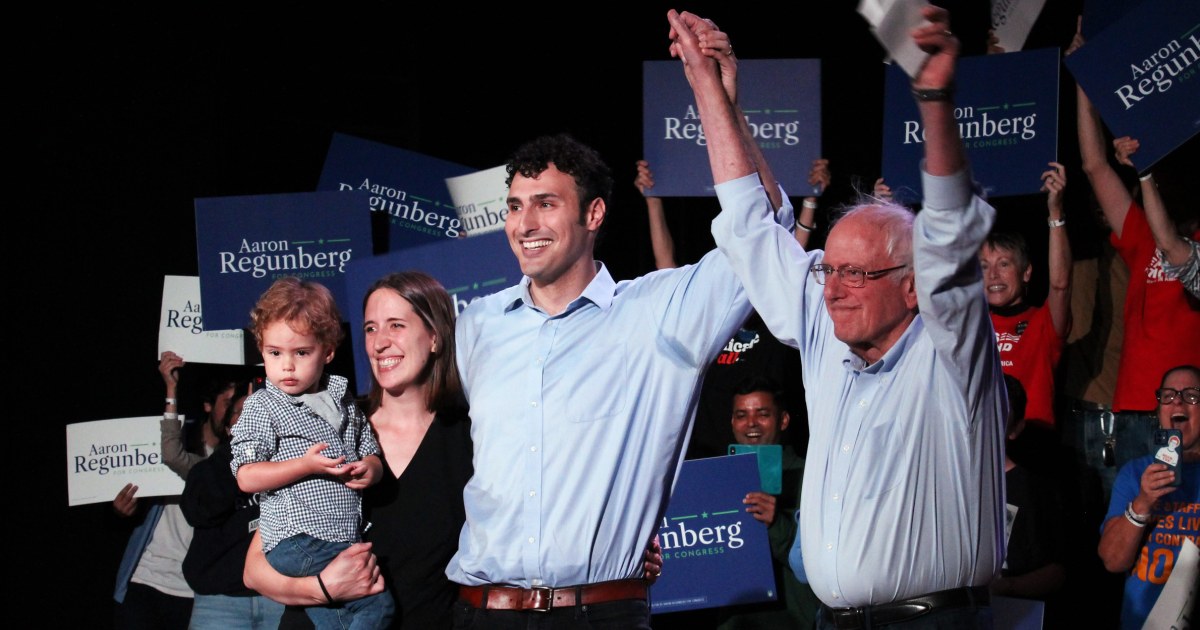
A progressive organizer backed by Bernie Sanders and Alexandria Ocasio-Cortez has a good shot at winning a congressional special election in Rhode Island on Tuesday — and some on the left are not happy about it.
The local chapter of Democratic Socialists of America issued an unusual anti-endorsement of former state Rep. Aaron Regunberg, urging supporters to “reject ‘progressives’ at the polls,” saying Thursday it was “disappointed in AOC and Bernie but not surprised” after the New York congresswoman endorsed Regunberg and the Vermont senator held a rally for him.
The Rhode Island chapter is unusually aggressive, but the local split reflects a larger divide among Democratic Socialists of America and other far-left groups as they debate their forced marriage with the Democratic Party several years after a surge in membership spurred by Sanders’ presidential campaigns made socialism politically relevant in America for the first time in decades.
“DSA was reborn after the first Bernie campaign, and the state of socialist politics can feel stuck or even declining considering we were thinking about a socialist becoming president of the United States,” said Micah Uetricht, a DSA member and editor of the socialist magazine Jacobin, who co-wrote the book “Bigger Than Bernie: How We Can Win Democratic Socialism in Our Time.”
“It’s tempting, especially in a moment of downturn, to say the reason why we’re not as successful as we should be is that we’re not adhering to a political doctrine as strongly as we should be,” said Uetricht. “There’s both a need to criticize left-elected officials if and when they stray from basic leftist principles, while also having some kind of understanding that we have just a toehold on power and that it could all go away.”
Some on the left worry infighting in the name of purity like that in Rhode Island could lead to a vicious cycle and help return the left to the wilderness of the pre-Sanders era.
“A lot of chapters would not endorse Aaron Regunberg because he’s not running as a socialist, that’s fine. But to issue an anti-endorsement of the most progressive candidate in the race? That’s bizarre,” said one Rhode Island activist who requested anonymity to speak candidly. “All these people do is yell on the internet.”
The tensions are familiar to any student of radical movements in history. And ideological movements often stagnate when their allied party wins the White House, and the unifying effect of a common enemy is replaced by the inherent messiness of governing.
Justice Democrats, the insurgent group that recruited progressives like Ocasio-Cortez, slashed its staff this year after a mixed record in Democratic congressional primaries, while prominent leftists have used words like “crisis” and “purgatory” as they debate their future. The problems facing far-left groups have led some to focus more on organizing among labor unions and tenants, rather than inside electoral politics.
The national DSA has criticized and even threatened to expel its own members elected to Congress for apostasy on issues like support for Israel and a 2022 vote to end a railroad strike.
In July, state Rep. Mike Connelly left his Massachusetts DSA chapter after he was threatened with expulsion for, among other things, endorsing Democratic Gov. Maura Healy’s re-election and appearing at an event with the Prince and Princess of Wales.
“The ‘charges’ were, essentially, that I demonstrated a willingness to work with and support elected leaders and activists who are delivering results for working class and marginalized communities. I am guilty as charged, and proudly so,” Connelly said on X, the platform formerly known as Twitter.
In Rhode Island, a one-party state that was until recently run largely by moderate and conservative Democrats, the local DSA chapter has been more aggressive than most others in deciding not to endorse Democrats in the future.
Another left-wing group in the state expelled several members it had helped elect over what critics said were routine votes.
“What changed in 2017,” after the Bernie bump and Trump’s election, “was that DSA members began running for office as open socialists and winning high-profile races,” said Daniel Crowell, spokesperson for the Rhode Island DSA. He added that while it was exciting to finally be running, “after a couple years, some DSA members were disappointed by the performance of DSA-endorsed politicians. It often seemed like they were joining the Democratic establishment rather than seriously challenging Democratic Party leaders.”
At the DSA’s national convention in Chicago earlier this month, questions about whether the group should form an independent political party and how vigorously it should discipline members in elective office were front-and-center, with strong opinions on both sides.
But a resolution for a full “clean break” with the Democratic Party fell short and a Rhode Island DSA member who ran for the national political committee on an anti-Democratic Party platform did not succeed.
Renee Paradis, a member of the party’s National Political Committee said opinion inside the DSA ranges widely, including those who want the group to be more active inside the Democratic Party.
But the consensus coming out of the convention, she said, remains that DSA should keep running candidates in Democratic primaries while building its own outside campaign infrastructure.
“Most working-class voters still heavily identify with the Democratic Party,” said Paradis. “Bernie’s campaigns and DSA’s own electoral campaigns have shown that we can build socialist power while tactically using the Democratic Party’s ballot line.”
Ari Rabin-Havt, Sanders’ former chief of staff and deputy campaign manager, said that while the public debate may be messy, it demonstrates the group’s commitment to democratic and transparent decision-making.
“Would I rather the Rhode Island chapter support Aaron? Of course,” he said. “But is it good that a democratic organization is having a public debate about how they’re going to create power and use power? Yes.”
“But there’s a choice that ultimately has to be made. Because there’s no way you are going to elect somebody and they are going to be 100% responsive to you all the time,” he said. “If you’re turning up the amp to 11 on everything, then nothing is 11.”

